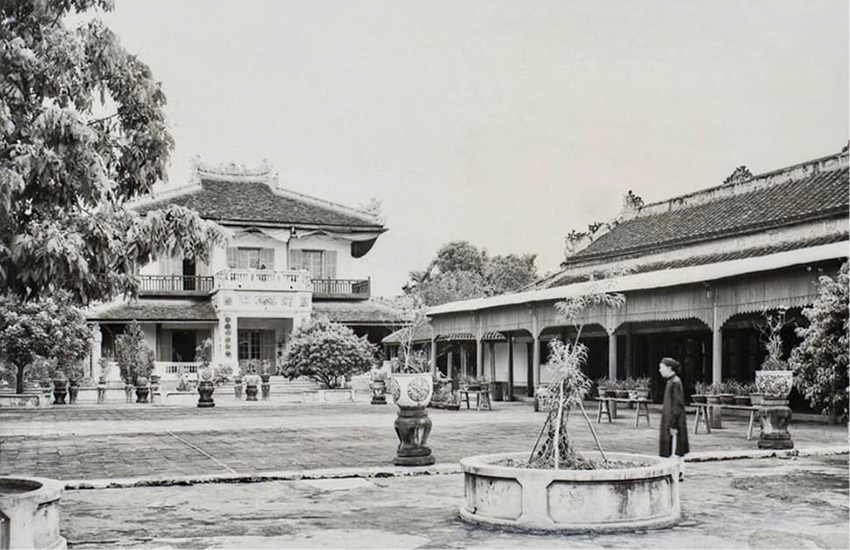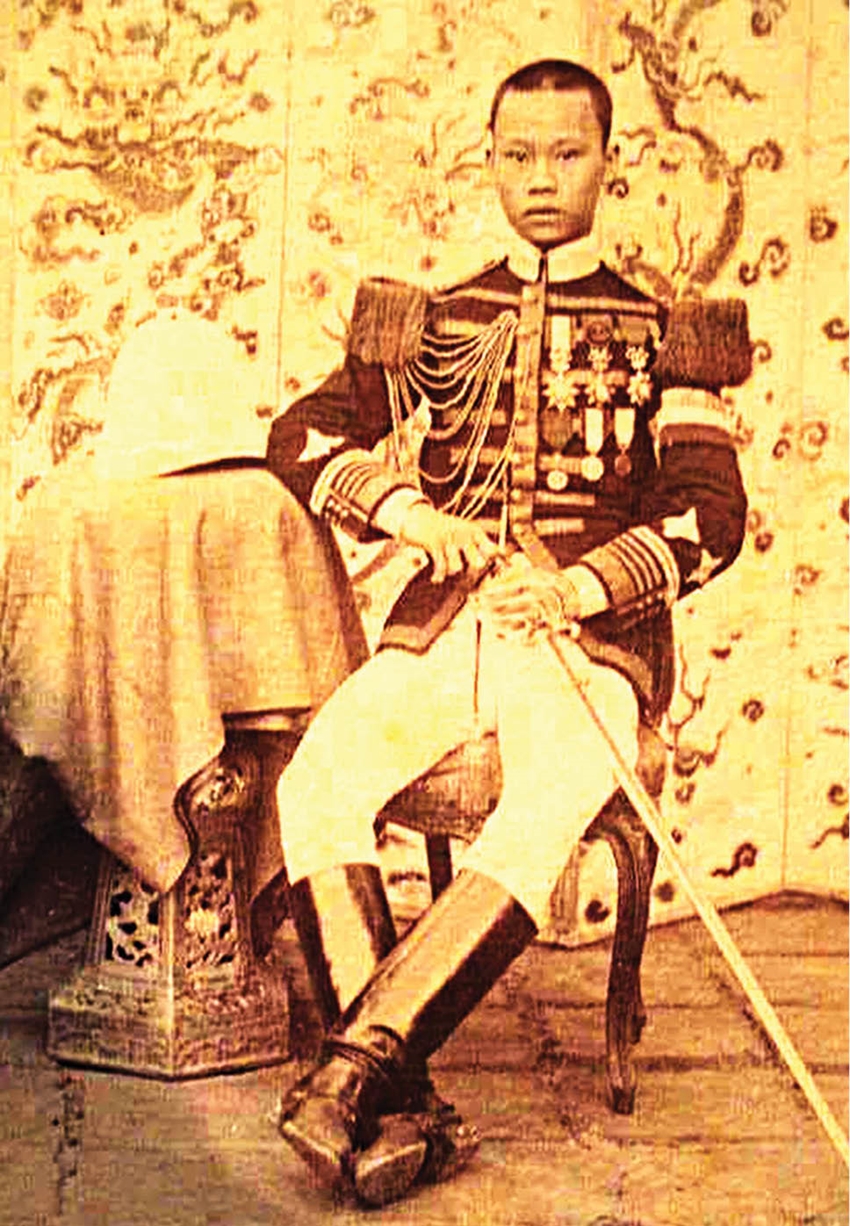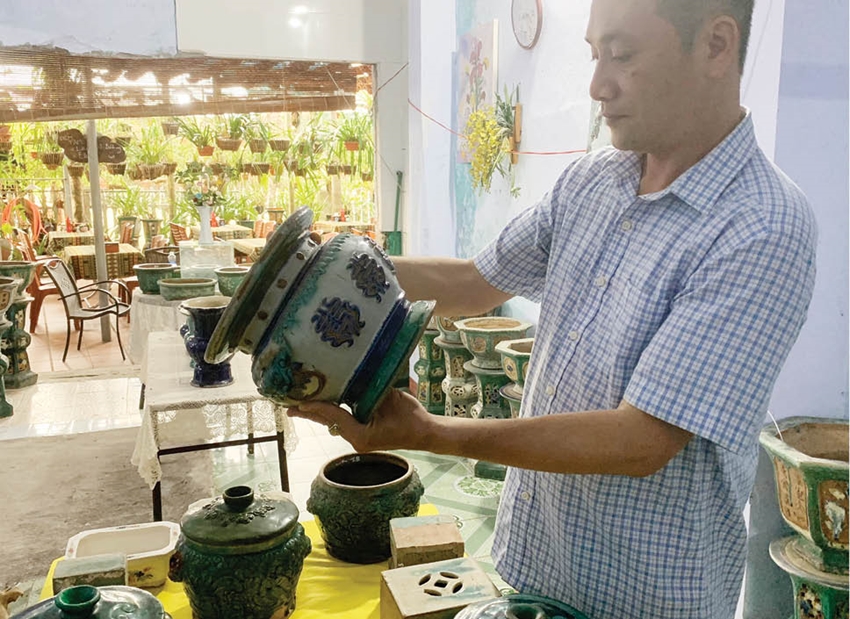    |
 |
| Pedestals and pots in the ancient Dien Tho palace |
Dated back to the history
On the map of Phu Gia Dinh drawn by Tran Van Hoc in 1815, there was the place called Xom Lo Gom (‘the Village of Pottery Kilns’) - one of the famous craft villages of old Saigon. Based on the instructions on this map and from the results of the field survey, archaeologists said that Cay Mai pottery kiln in Go Cay Mai was among the ancient pottery kilns in Saigon.
Cay Mai ceramic products include large-sized ordinary ceramics with fine art decorations, water pipes, terracotta statues and colored enameled crockery. Common decorative products of Cay Mai ceramics are pedestals and ornamental pots, and religious worship utensil.
Flourishing in the late 19th and early 20th centuries, Cay Mai ceramics gradually lost. It was cited in the book Cay Mai Ceramics - Ancient De Ngan Saigon by Huynh Ngoc Trang and Nguyen Dai Phuc that the French researcher Péralle M. Derbès once said: “The Cay Mai Ceramics were rewarded a Silver medal at the 1880 exhibition in Cochinchina. The products of this pottery line were famous in Cochinchina and abroad, especially in the French market.”
    |
 |
Emperor Thanh Thai by a Cay Mai ceramic pedestal
According to Vu Kim Loc, the “apricot tree” in Cay Mai ceramics was not a yellow apricot or water jasmine, but a white apricot tree which blooms only once in the spring, unlike the twice-blooming yellow apricot, or the white apricot in the North.
The flower has 4 thick petals, and its shape is similar to the mastwood flower in the South. It has a cluster of pure white flowers and yellow pistil with a pleasant aroma. When it blooms, the tree sheds its leaves.
During blooming, the tree top is covered with a pure white color, displaying a pure beauty of nature. At night, the wind blows the sweet scent spreading an entire area. The blooms last for about two weeks, but the petals are still white.
As one of the established pottery line, Cay Mai ceramics are featured by hard earthenware and simple enamel, which makes the distinguished. The two major colors, blue and green, and complementary colors of yellow, black, sepia, brown and white have contributed to shaping this ancient fine art ceramic brand.
With decades at peak development, Cay Mai ceramics were present throughout the Southern Vietnam under the Nguyen Dynasty. Like many other top products of the country in the past, Cay Mai ceramics, in many ways, were present in daily activities of the royal family, in the royal court and the imperial palaces in Hue either through offerings or purchases.
In his research on the reformed military uniform of the emperors of the Nguyen dynasty through photographs, Vu Kim Loc found out that the ceramic pedestal on which Emperor Thanh Thai placed his crown was of Cay Mai ceramics.
“This shows that the emperors of the Nguyen dynasty had preferred to use domestic products, and this proves that the Cay Mai pottery line was once honored by the Nguyen Dynasty emperors,” Vu Kim Loc concluded. If you have the opportunity to visit Hue Imperial Citadel, it is easy to recognize the presence of Cay Mai ceramic pedestals and pots in The Mieu courtyard and Can Chanh Palace.
Many exhibitions to come
Spending 10 years pursuing and collecting Cay Mai ceramics, Mr. Tong Phuoc Quang, from Vy Da ward (Hue City), is fascinated by the beautiful glaze as well as the deep history of this ceramic line. Cay Mai ceramics are beautiful because, projects with very meaningful historic stories expressing the philosophy of life and the ancient concept of life were engraved on each item produced.
“For example, the project of “perennial cedrus tree and crane”, including the image of fairy cranes and cedrus trees. Ancient people considered the cedrus to represent a hundred trees. In addition to the meaning of longevity, the cedrus tree is also a representative of the noble charisma. The pattern “perennial cedrus tree and crane” has the meaning of longevity and noble charisma,” Mr. Tong Phuoc Quang explained.
    |
 |
Tong Phuoc Quang cherishes the precious collection of Cay Mai ceramics
With the appearance beauty and cultural significance, Cay Mai ceramics are attracted and welcomed by many ceramic enthusiasts. In his cafe, Mr. Tong Phuoc Quang has a space to display a collection of Cay Mai ceramics.
He told me that many people from Ho Chi Minh City, Hanoi or Can Tho stopped by his place in Hue for a chat about pottery and for some photos and then hurried on business. He enjoyed and appreciated their interests in the cultural beauty of an ancient pottery line.
For public interest, Tong Phuoc Quang expanded his space for ceramic displays for his passionate friends to visit and admire the beauty of pottery. He also bought the Nhat Binh ao dai, so that those who would like to take pictures by the ancient ceramics can wear.
He said with a smile: “Thanks to the Nhat Binh ao dai, many people have become more interested and come to chat, listen to my stories about pottery, history, and projects on ceramic products, and then they happily wear ao dai to have souvenir photos.”
He also added that he and his pottery-passionate friends would co-organize a contest and exhibit Cay Mai ceramics in Hue in early 2023 to create a hub and spread the passion for Cay Mai ceramics.
“I hope that more people will understand about the beauty and cultural values of this pottery line, thereby preserving as much as possible the products from the lost ceramics,” he said.
Photos: Dang Trinh and from archive
